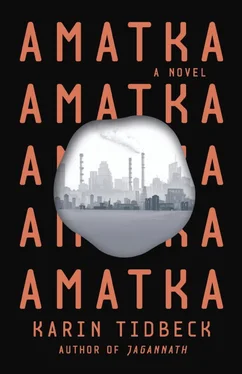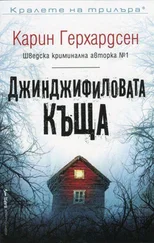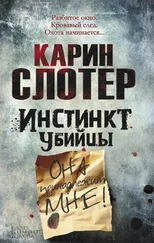Карин Тидбек - Amatka
Здесь есть возможность читать онлайн «Карин Тидбек - Amatka» весь текст электронной книги совершенно бесплатно (целиком полную версию без сокращений). В некоторых случаях можно слушать аудио, скачать через торрент в формате fb2 и присутствует краткое содержание. Город: New York, Год выпуска: 2017, ISBN: 2017, Издательство: Vintage Books, Жанр: Фантастика и фэнтези, на английском языке. Описание произведения, (предисловие) а так же отзывы посетителей доступны на портале библиотеки ЛибКат.
- Название:Amatka
- Автор:
- Издательство:Vintage Books
- Жанр:
- Год:2017
- Город:New York
- ISBN:978-1-101-97395-0
- Рейтинг книги:4 / 5. Голосов: 2
-
Избранное:Добавить в избранное
- Отзывы:
-
Ваша оценка:
- 80
- 1
- 2
- 3
- 4
- 5
Amatka: краткое содержание, описание и аннотация
Предлагаем к чтению аннотацию, описание, краткое содержание или предисловие (зависит от того, что написал сам автор книги «Amatka»). Если вы не нашли необходимую информацию о книге — напишите в комментариях, мы постараемся отыскать её.
Amatka — читать онлайн бесплатно полную книгу (весь текст) целиком
Ниже представлен текст книги, разбитый по страницам. Система сохранения места последней прочитанной страницы, позволяет с удобством читать онлайн бесплатно книгу «Amatka», без необходимости каждый раз заново искать на чём Вы остановились. Поставьте закладку, и сможете в любой момент перейти на страницу, на которой закончили чтение.
Интервал:
Закладка:
Vanja recognized the childish handwriting. It was the rest of the letter from Jenny, the girl who wrote about her longing for disposable pads. The part Evgen had told her had been culled.
“Cats,” Vanja said. “Dogs… what are they?”
“Animals. A type of organism, fairly large.” Evgen gestured at knee height. “In the old world, they were kept as companions. People would eat some of them.”
Vanja shuddered at the thought. “So they brought those? It says she saw them in the street.”
Evgen shook his head. “The pioneers didn’t bring any animals at all, I know that much. I’ve read somewhere that they had plans to bring animals later, but it never happened. Something prevented them.”
“But if they didn’t bring any animals…”
Evgen looked at her in silence. He pointed at the letter.
I had been dreaming about the time we spayed Sascha, and she hid behind the sofa in the living room for two weeks. I woke up because there was a noise from the kitchen: a faint knocking, and then a scraping sound, over and over. Tock rasp, tock rasp.
I got out of bed. Raul was still sleeping. I went out into the kitchen. It was Sascha. I would have recognized her anywhere—her thin, crooked little body, her bow legs, her fur that always looked dusty. She was wearing the cone. She was straining with the cone against a kitchen cabinet, as if she was trying to wriggle free of it. Then the cone slipped across the cabinet door. Rasp. Sascha got up again and drove the cone into the cabinet: tock.
I called for her. Come here Sascha, come here sweetie, I said. And she turned her head and looked at me. Then she meowed.
Do you remembered how Sascha had such a ridiculous voice? She sounded like a squeaky toy when she meowed. She was so tiny and crooked and grumpy. She was really not a very nice cat. But it was just because she was such a little runt that I couldn’t help but love her. We belonged together that way, somehow. Do you remember how she was always at the bottom of the pecking order in the yard? She was allowed on the compost heap and under the dumpster. Everything else was claimed by the other cats. She’d sit there on the compost heap and chase flies. She’d never let you pet her. But sometimes, if you sat very still for a long time and pretended she wasn’t there, she would slink over and curl up in your lap.
I’m stalling. The thing that happened in the kitchen. I suppose nothing actually happened. I called for her, and she turned around, and she made a sound. It didn’t sound like a cat. It was a sort of bleat, like a sheep, no that’s not a good description, but it’s as close as I can get. It wasn’t a cat sound. It wasn’t Sascha, it wasn’t a cat at all.
Vanja turned the paper over, but the other side was blank. If there were more pages, they were missing. “What was it?” she asked.
“The animal?”
“Yes.”
Evgen gave her a long look. “I think you know.”
Vanja folded the paper. Her hands were trembling.
“Read more.” Evgen browsed through the pile and pulled something out. “Here. It’s by an industrial inspector.”
They were pages torn from a book, a log.
Upon arrival, the controller had immediately gone to the factory’s employee quarters. He didn’t look at the employee log, explaining that he usually didn’t read it until bedtime. Apparently the controllers use the log to leave messages for each other. The controller had cooked himself a dinner consisting of preserves from the storage. He then made a preliminary examination of the factory in preparation for the main inspection next morning.
According to the controller, everything initially appeared to be in order. The assembly line started at one end of the factory, where the raw material was poured into the blender. The finished product was packaged at the other end of the factory, a hundred yards away.
When I asked the controller if anything in particular had raised his suspicions, he replied that the sound of the factory was different. Strange noises came from a source the controller was unable to identify. He said: “They sounded like little squeals.” The controller went through the factory and checked the different stations. After some time, he realized the noise emanated from the conveyor belt.
He “stood at the end of the belt, where finished tubes were packed into boxes for transport. They wouldn’t lie still in their boxes. All the tubes, containing Facial Cream #3, were emitting faint little squeals. There was a louder noise coming from the tanks containing the paste that was about to be poured into molds. Every time the paste was squeezed into the tubes, I heard a howl.”
The controller followed the emergency protocol: he shut down production immediately, sealed the factory doors, and telephoned the office to alert them to the incident.
It was in the employee log that we found out what had caused the malfunction: the controller who had visited a week earlier to restock the preserves in the employee quarters. The pages in the log were filled with made-up, bizarre observations of the factory and the repeated claim that the machines were alive and wanted to procreate.
The products were scrapped and the factory quarantined. This is not an unusual event, and according to the commune office a year should be enough for conditions to settle. After that, production can resume as normal. Until then we will be using another factory in the vicinity.
Vanja put the papers back in the box. There was a sour taste on her tongue.
“I was on the committee a few years back,” Evgen said. “I was deposed. It’s a long story, but in any case, they offered me to resign voluntarily in exchange for a job at the library. I was entrusted with the task of redacting the archive material.” He gestured at the box. “I should have scrapped it. And I did, at first. But then I couldn’t do it anymore. I wanted to know.” He looked up at Vanja. “Now I’ve entrusted this to you. You want to know. So few people want to know.”
Vanja sat in silence, staring at the box. Her hands were freezing. She shoved them into the sleeves of her anorak. “We’re the ones creating everything. Everything.”
“They pump the raw sludge out of the ground over in Odek,” Evgen said. “And then shape it in the factories.”
“And we have to keep telling it what it is. Or it’ll revert to sludge.”
“But it’s not just that. That… cat… came from somewhere.”
“They talked it into existence.”
“Just like Colony Five talked itself into destruction….”
Vanja felt slightly sick at the thought of it.
“It doesn’t have to be a bad thing,” Evgen continued. “If we could harness it. Or if we could somehow live in harmony with it.” He pointed at the papers. “It all starts with us forcing matter into a shape it can’t maintain. If we didn’t, if we could learn to live another way… But we can’t, as long as all this knowledge is kept secret.”
Evgen put the inner lid back on, then the outer one. “I don’t know how much you’ve heard, but fifteen years ago we lost almost a hundred people.”
“The fire in the leisure center?”
“There was no fire. It was Berols’ Anna. The poet with the Plant House series. She left with a group of followers to start a new colony.”
“What happened?”
“I don’t know. They sent out a rescue team after a while. Officially, the rescue team found everyone dead, and then the story changed again—no one had ever left. Not even the members of the committee found out what had happened. Only the rescue team and the Speaker at the time knew, but he’s dead now. Anyway, I think it’s the other way around. I think Anna’s people managed to create something new. Real freedom.”
Читать дальшеИнтервал:
Закладка:
Похожие книги на «Amatka»
Представляем Вашему вниманию похожие книги на «Amatka» списком для выбора. Мы отобрали схожую по названию и смыслу литературу в надежде предоставить читателям больше вариантов отыскать новые, интересные, ещё непрочитанные произведения.
Обсуждение, отзывы о книге «Amatka» и просто собственные мнения читателей. Оставьте ваши комментарии, напишите, что Вы думаете о произведении, его смысле или главных героях. Укажите что конкретно понравилось, а что нет, и почему Вы так считаете.












![Карин Тидбек - Аматка [ЛП]](/books/438406/karin-tidbek-amatka-lp-thumb.webp)